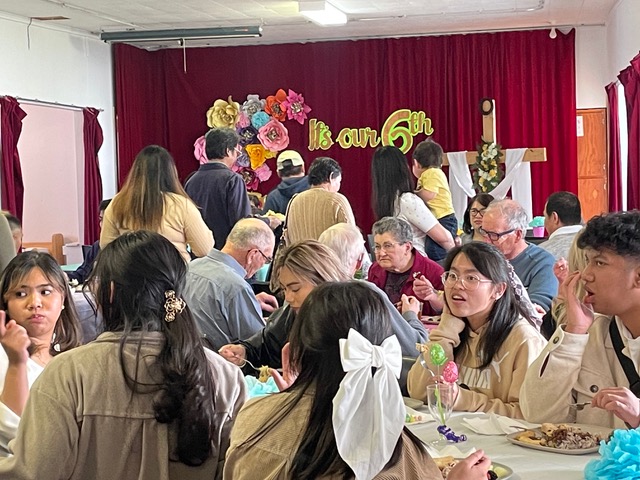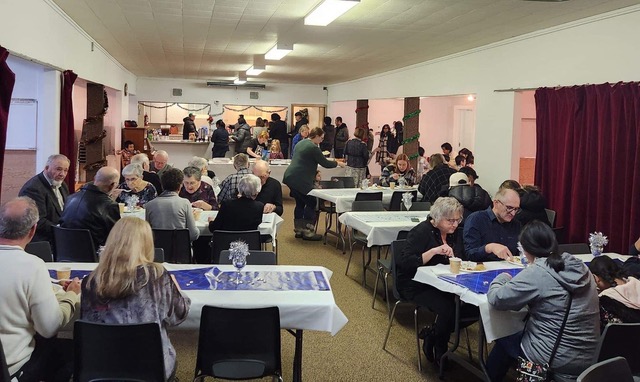Big buildings; fewer people. It’s a fact that many Mennonite churches have fewer people involved in church life than they did 20 years ago. Many churches across Canada were constructed or remodeled when attendance was higher; when the church was busy with events and programming every night of the week. In the current reality of quieter schedules, some Mennonite churches have begun sharing their spaces with other congregations.
Three Mennonite Church Saskatchewan congregations—Mount Royal, Wildwood and North Star—have similar stories of how they began sharing their buildings. In each case, a leader from another congregation appeared at the church and inquired about renting the space on Sunday afternoons for worship services. In all three cases, the interested congregations were very different from their Mennonite hosts in terms of ethnicity, theology and worship style. And in all three cases, the host churches decided to give it a try.
“We said yes, really, because we didn’t have a good reason to say no,” said Joe Heikman, pastor of Wildwood Mennonite in Saskatoon. “When I was pastor in British Columbia, I worked in a multi-congregational building, with lots of positive relationships, and good shared experiences, and I liked the idea of something similar growing here.”
Even though the renting congregations were technically “just renters” in the three cases, there was a desire on all sides to build connection and relationships, for the arrangement to be about more than just a line in the budget or a slot on the weekly schedule. This desire became both a source of joy and a point of friction.

All three churches experimented with an occasional joint worship service or a shared meal, with varying degrees of success. North Star Mennonite Church in Drake has built a mutual relationship with their renters, Prairie Light Christian Fellowship, a Filipino Pentecostal church plant. “We’ve both tried . . . to be in community with each other and navigate those cultural differences,” said Lisa Martens Bartel, pastor of North Star. “The Filipino population here is large enough that they could just stick to themselves, but they’ve really tried to be together with us and vice-versa.”
The two congregations hold quarterly joint worship services and summer potluck picnics.
Mount Royal Mennonite Church in Saskatoon has changed their Sunday worship service time so that the two congregations would be coming and going at the same time, according to Len Andres, the church’s administration minister. “We’re not in this to make money. We’re both in the same business. We’re in the same family,” he said.
In most cases, the tensions that arose from sharing a space were things one might expect: doors left unlocked, supplies not properly put away or messes left behind. Expectations had to be reiterated and rental agreements renegotiated. “We’ve decided to just say, ‘it happens,’ everyone is trying their best,” said Andres. Martens Bartel echoed that sentiment: “It’s been good for us to be forced to bend a bit, and as the host church, I think you have to be gentle in how you approach building community because there’s a power differential.”
For Wildwood, the differences in values and theological stances became too great. Despite their best efforts, in 2022, Wildwood ended their rental arrangement with their tenants—a Filipino group—after six years.
The rental had created increased workload for church staff over the years and the two congregations’ approaches to “being the church” proved too different, explained Heikman. “We share our building with lots of different groups, and many of those aren’t ministry groups. Our council came to a time of re-visioning and asking what it looked like to do God’s work in the world, to help us determine our priorities in who uses this space. Out of that conversation we discerned that we didn’t share the same values [as the renting congregation]; we weren’t doing the same work, and, in some cases, it was actually oppositional.”
Despite the difficult decision, Heikman said the church was grateful for what they had learned through the experience. “We’re still very open to multicultural, multi-denominational ways of being the church, it’s just that this one didn’t blossom like we had hoped.”








Leave a Reply
You must be logged in to post a comment.